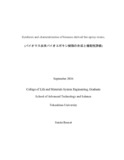Please use this identifier to cite or link to this item:
http://archive.nnl.gov.np:8080/handle/123456789/365Full metadata record
| DC Field | Value | Language |
|---|---|---|
| dc.contributor.author | Basnet, Sunita | |
| dc.date.accessioned | 2019-03-27T08:13:54Z | |
| dc.date.accessioned | 2020-08-21T07:33:41Z | - |
| dc.date.available | 2019-03-27T08:13:54Z | |
| dc.date.available | 2020-08-21T07:33:41Z | - |
| dc.date.issued | 2019-03-27 | |
| dc.identifier.uri | http://103.69.125.248:8080/xmlui/handle/123456789/365 | - |
| dc.description.abstract | Increasing industrialization has caused sudden rise in energy consumption. Traditional methods of energy production being based on fossil fuels like oil and gas, have resulted in the emission of excess greenhouse gasses (CO2), which is the main cause for the climactic changes. The climate change (especially temperature rise) could lead the glacier to melt, causing the raise in ocean level subsequently, endangering the existence of plants and animals. Hence, to reduce these kind of environmental issues, an immediate action should be taken to discourage the consumption of fossil fuels, by encouraging the use of renewable plant biomasses.Biomass is one of the most promising alternative energy sources, becauseof their carbon neutrality and availability from multiple sources. In the effort to search the different biomass resources for the synthesis of epoxy resins, the renewable resources like green tea extract, lignin extracted from different woody biomasses i.e., eucalyptus, bamboo, and cedar were extensively studied in this thesis work. The active ingredients of Japanese green tea (Camellia sinensis) were utilized to synthesize bio-based epoxy resin. The catechin compounds in the aqueous extract of green tea were functionalized with epichlorohydrin under alkaline conditions in the presence of tetramethylammonium chloride (TMAC), a water soluble phase transfer catalyst. A good yield of resin was synthesized, and curing was performed with methanol soluble lignin extracted from eucalyptus. The epoxy networks, so synthesized, were compared with bisphenol-A (BPA)-derived epoxy network. | en_US |
| dc.language.iso | en_US | en_US |
| dc.subject | biomass resources | en_US |
| dc.title | Synthesis and characterization of biomass derived bio-epoxy resins. | en_US |
| dc.type | Thesis | en_US |
| Appears in Collections: | 500 Natural sciences and mathematics | |
Files in This Item:
| File | Description | Size | Format | |
|---|---|---|---|---|
| Sunita Basnet thesis-PDF.pdf | 844.21 kB | Adobe PDF |  View/Open |
Items in DSpace are protected by copyright, with all rights reserved, unless otherwise indicated.